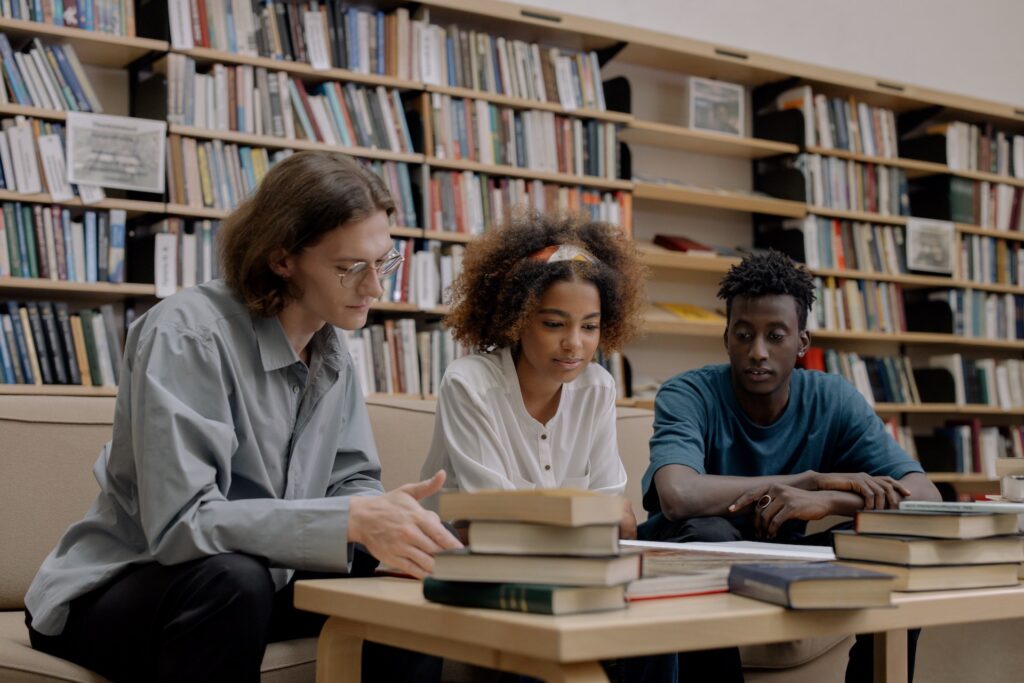
The Vision
More than 125 years since the University was first established, Te Herenga Waka— Victoria University of Wellington continues to foreshadow and respond to the changing environment in which it operates.
In particular, the University recognises the need to continue to adapt and provide leadership in a rapidly globalising tertiary education environment.
The University’s 2020-2024 Strategic Plan makes it clear that “To thrive in this sector, a university must have an identity that is respected, clearly differentiated from other universities, and distinguished by attributes that matter to its staff, students, and communities.”
Foremost amongst the attributes that matter to Te Waka Herenga, its staff and the communities in which it operates, is the desire to attract and serve a diverse range of students, and to see them succeed and thrive; coupled with a determination to be culturally responsive, and to continue to grow and enhance the University’s national and international relevance, impact and reputation.
The benefits being realised by the Titoko-Student Success programme are central to the University’s ability to continue to deliver a world–class experience for future and current students.
The Tītoko programme has been transformative for the University, delivering:
- The Student Success advisory entity
- Three new, technology platforms
- Kurawai, a networked Customer Relationship Model (Microsoft Dynamics365 CRM)
- Pūaha, a modern student self service portal (Microsoft Power Apps) integrated with the Kurawai
- A modern Admission and Enrolment platform (Power Apps/D365), incorporating Pūaha, which dynamically adapts to a student’s admission and enrolment status
Tītoko Student Success
A streamlined and integrated service that anticipates and meets the
needs of our diverse student population, and supports academic success
Titoko – Centre for Student Success Student Success Centre
A multi-channel personalised advisory service for students

Kurawai - CRM
Dynamically linked to all student management systems

Admission & Enrolment platform, student portal
Modern, flexible, greater opportunities for conversion and engagement


Titoko-Centre for Student Success
A multi-channel, personalised advisory service for students.
- 18 month project, from concept proposal to delivery
- Hub, spoke and rim delivery model, providing integrated services & support for students
- Centralised service centre where students can access support & advice across multiple channels
- New holistic advisory model, new holistic adviser roles – delivering processes supported by a new ‘case management’ module in the CRM, new data models and analytics, and student success adviser dashboards

Titoko-Centre for Student Success
A multi-channel, personalised advisory service for students.
18 month project, from concept proposal to delivery
Hub, spoke and rim delivery model, providing integrated services & support for students
Centralised service centre where students can access support & advice across multiple channels
New holistic advisory model, new holistic adviser roles – delivering processes supported by a new ‘case management’ module in the CRM, new data models and analytics, and student success adviser dashboards
Kurawai
A dynamically-linked CRM that records student interactions and provides a holistic view of a student’s relationship with the University
18 month project, from concept proposal to delivery
Records student interactions and enables a holistic view of a student’s relationship with the University
Enables targeted and differentiated support for each cohort of students and ensures that the support provided is timely and sensitive to the specific needs of each student
Dynamically linked to all student management systems, including the new admission & enrolment platform
kurawai
A word that describes a reservoir where water is held and which connects to Pūaha (river mouth). It is also a composite word meaning ‘treasured water’—since this new tool relates to student information (taonga), Kurawai acknowledges its special value too.
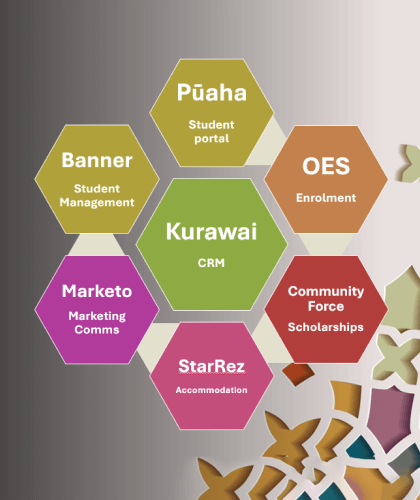

Admission and enrolment platform, Student portal
Modern, flexible, greater opportunities for conversion
12 month project, from concept proposal to delivery
Separated, streamlined, and digitised the admission and enrolment processes so students can start the application process at any time of the year and commit to the University earlier
Reduced manual intervention and fully delegates admission decision-making authority to provide a streamlined and faster turnaround of student applications
Provides personalised access to a student portal so the onboarding journey can be joined up across the various touchpoints.
An Advisory Structure that Reflects Students’
Own Diversity & Value
Holistic advice and guidance, supported by modern technology.Tītoko – the Student Success Centre - is a new entity within the University, that brings together new technology & new ways of working; with staff collaborating to provide tailored advice to students encouraging & supporting their educational aspirations.
Tītoko – the Student Success Programme was first proposed in early 2020, but its purpose was to address a much longer-standing issue that has vexed many universities – how to proactively support a very diverse range of students, from when they first decide to apply to study, through to graduation.
Consistent with its ideals, and after design consultation with staff and students, the University has implemented:
- a new holistic advisory model
- a multi-channel student service centre
- a new admission and enrolment process
- enhanced student finance functionality
- modern enabling technologies
Its student communities encompass a wide range of ages, ethnicities, and gender and sexual identities. Some students are also parents or grandparents; some are returning students, some come from refugee backgrounds; and some have disabilities. Some of the University’s staff are also current students, providing them with a unique perspective.
It has approximately 22,000 students, including international students from around 100 countries.
The University’s values in implementing the Student Success Programme are reflective of the broad diversity of its students and the characteristics that distinguish them.
The University draws on its constitutional framework, enriched by Te Tiriti o Waitangi and its civic-university tradition, which positions it to lead and influence thinking on major issues that affect Aotearoa-New Zealand’s environmental, societal, cultural, and economic wellbeing.
Realising Benefits
The Titoko – Student Success Programme is enabling the University – and its students – to realise significant benefits
-
Increased Student Enrolments
The separation and centralisation of the admission function improves efficiency, increases enquiry to enrolment conversion, and enables student admission all year round.

-
Improved Student Performance & Retention
Proactive monitoring of student engagement & performance enables early intervention of at-risk & under performing students.

-
Connected and Engaged Students
The provision of a personalised and supportive environment through the student advisory model ensures students are more connected and engaged with the University.

-
A Holistic View of Students
The ability to access a 360-degree view of student interactions better informs decision making and the delivery of student services.

-
Improved Student Experience
The provision of intuitive and personalised digital tools enables students to access services when and where they want; and a separated, streamlined admission and enrolment process provides greater flexibility and certainty.

-
Improved Efficiency & Productivity
The removal of paper forms, manual processes, and duplication improves the delivery of student services and enables staff to focus on services that students value most.

-
Cost Savings
Reduced cost of service delivery through the standardisation and centralisation of student services functions and processes, is improving cost efficiency.

-
Staff Development
The establishment of a defined career path for staff who support and advise students can provide opportunities for career development and advancement.

-
Continuous Improvement
The establishment of systems, processes, and operating model provides agility & enables ongoing improvements to be realised.

-
Risk Reduction
Reduced risk of lost revenue through a low conversion rate and early exit of students.


The Challenges
The programme anticipated & successfully navigated through a number of complexities, including:
- The transition between old/new ways of working
- Introducing new technology to staff and providing support and training
- Data integration from multiple platforms, some of which were more than 20 years olds
- Extreme complexity – the admission & enrolments processes were exceptionally complex, & had been characterised by multiple workarounds & manual processes; as well as a low level of delegation
- Timeframes – all three elements of the new
platform were designed, built & tested within very
short timeframes, responsive to the University’s
need to provide timely advice to students & make
admissions and enrolment available to students - Staff availability – for confirming procedures and testing the new platform

Titoko-Centre for Student Success
The Student Success Programme was delivered by a small but very experienced project team, which evolved and adapted as the programme progressed. It included the following roles and functions:
- Project manager
- Project sponsor (University Provost)
- Transition Leads
- Procedure documentation specialist
- Change managers
- (External) independent governance adviser
- Programme director
- Communications and engagement specialist
- Senior business analysts
- Governance group (senior University leaders)
- Training & development leads
- (External) technical design and build specialists
Partnerships
A group of subject matter experts provided timely advice and guidance, and tested the design throughout its build.
The team also worked collaboratively with staff in marketing, web advisory and corporate communication roles, finance, human resources, & other student-facing services such as accommodation and scholarships.
During the two-year life of the project, the team worked closely
in partnership with a wide-ranging group of administrative and
academic staff from across the University and particularly with
student advisors and the domestic and international admission
and enrolment and digital solutions teams.
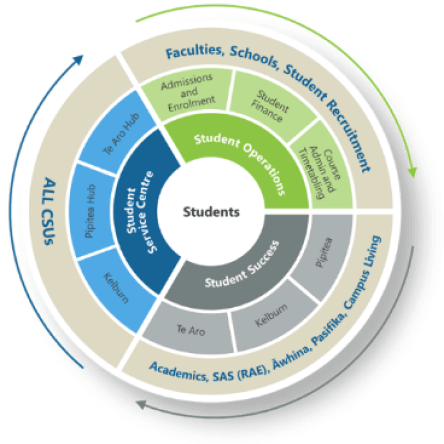
“Tītoko – Student Success Programme – co-designed, integrated across student-facing platforms, great user experience.”
Student-Centred Design
Importantly, the team recruited a representative group of students, who provided valuable design input, testing and feedback throughout the project, to help inform and refine the design and delivery of the Pūaha, the student portal Student Service Centre and the admission and enrolment platform, in particular.
From time to time, the Programme successfully sought top-of-mind feedback from students by setting up a desk in “The Hub” – a high-traffic on-campus meeting place; where students were asked to contribute their views of design Was this done throughout the programme or just for Puaha and admission/enrolments?
Sprints
Over the entirety of the Programme’s delivery, a series of ten short, focussed design and build sprints were completed, based on an expanding portfolio of user stories and user requirements.
Amongst the priorities for the project was managing the ongoing availability of staff and students to test new deployments, which required close collaboration, change management & communications to help manage the transition. It was achieved through frequent engagement and proactive planning.
The Builds
Kurawai – the CRM-Kurawai, the student relationship management system,was built using a Microsoft Dynamics 365 platform. The primary system enables the University to manage its Student Success Programme, and the end-to-end admission process for current and future students. The system maintains the details of nearly 200,000 students, and is integrated with all major student-facing systems. From concept to completion was an 18-month journey, which began with a co-design sprint involving staff.
Pūaha – the student portal-Pūaha, the student portal, was built using Microsoft PowerApps, which talks with the CRM,Kurawai,by leveraging a Dynamics CRM platform, and is integrated with more than ten different University systems. From concept to completion was an 18-month2 year journey, which began with a co-design sprint involving staff and students.

Tools for planning, staying connected and tracking task completion
- The Programme team used a range of web-
based tools for planning, recording, tracking
and communicating proactively about tasks;
and for measuring them against broader
Programme objectives. - These included AzureDevOps (for logging work
tickets), MS Teams (for updates, conversations
and sharing), Miro boards (planning & progress),
and Monday.com (risk and issues register). The
team also met in-person at frequent intervals,for
planning and critical review sessions.
Communications, Engagement & Change Management
Aside from regular governance and risk reporting, considerable effort was made to manage communications with stakeholders, & mindful that the Programme was possibly the largest change that University staff had experienced for some decades – to support the transition to new technology, processes and ways of working through effective change management.
Change management support for staff included extended Early Life Support, managed through floor-walking & Teams channels; and an AzureDev Ops system for lodging and tracking requests for support, enhancements, or changes.
Staff were also resourced to self-manage through the transition with procedure and process documentation and Quick Reference Guides published on a dedicated Sharepoint site. Explanatory information, scripting & templates were also provided in a Knowledge Base. An application called Walk Me was also installed, to guide staff step-by-step through processes, and provide tailored guidance.
Staff from the project team held “Mission Control” meetings every morning at which issues & workplans were discussed; & from which daily update were produced and distributed to key stakeholders across the University.
Occasional issues briefs were developed for the governance group, providing situational assessments, keylines & strategies to manage any potential risks. The project also regularly contributed articles & update to University newsletters & MS Teams channels, & maintained several intranet pages.
As part of the hand-over to business-as-usual, the project hosted a series of forums for University staff and providing answers to any questions, and signposting to ongoing support and resources.
The project team also worked closely with marketing and corporate communications staff to feed into student-facing newsletters, marketing campaigns, and change messaging; as well as providing advice to support the management of Pūaha, the new student portal developed as part of the Programme.
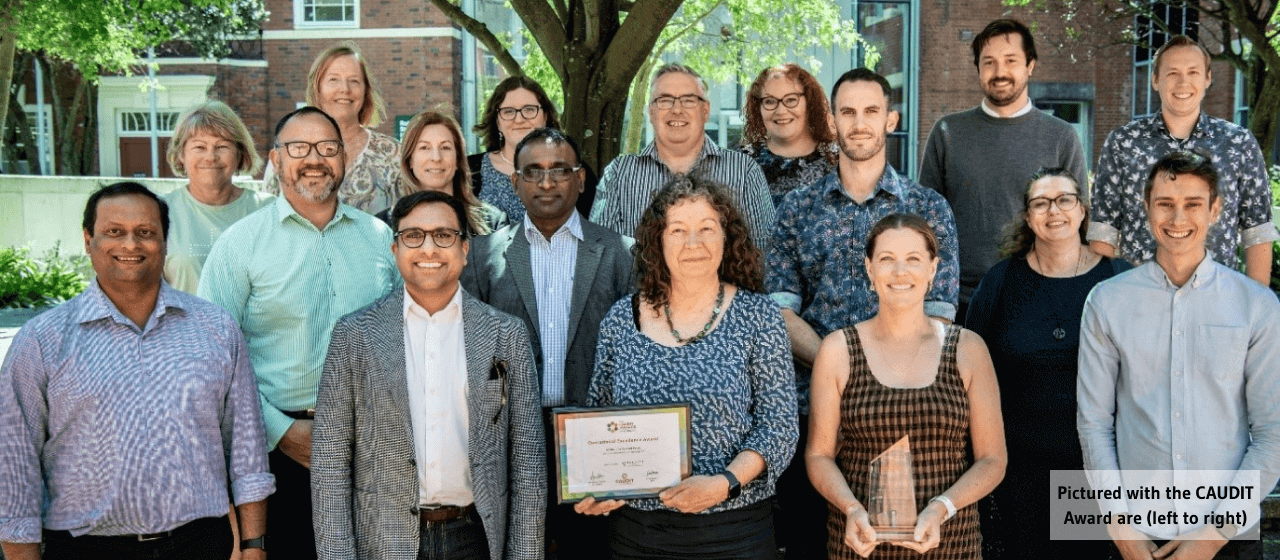
Front Row
Pradeepa Subhash – Test Lead, Cyrus Ranchhod – SSP Programme Director, Professor Wendy Larner – Provost, Zoe Lenihan-Geels – Transition Lead/Service Designer, Timon Bakker – CRM Support Specialist
Middle Row
Adrienne McGovern-Faircloth – Associate Director, Student Success, Richard Neal – Director, Tītoko, Angela Davies – Principal Adviser, Paerangi, Anandh Kathiresan – Senior Project Manager, Ryan Nicholson – Manager, Service Design & Development, Melinda Boyce – Executive Assistant, Tītoko
Back Row
Leigh Torode – Student Systems Trainer, Jaimee Murdoch – Training & Development Lead, Peter Borich – Associate Director, Digital Transformation, Melissa Martin – Lead Business Analyst, Alex Boonen – Programme Coordinator, Ryan Krug – Manager, CRM and Student Systems
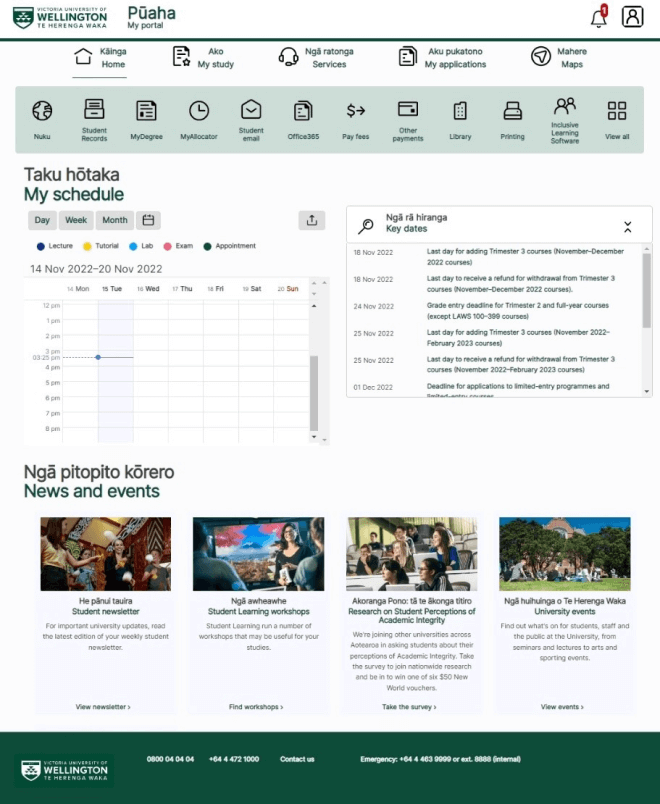
Pūaha - an award-winning student portal
Developed under the Student Success Programme, Pūaha – the University’s new student portal –has won a prestigious international award.
It is the 2022 winner of the international CAUDIT Operational Excellence Award.
The annual CAUDIT Awards highlight excellence and innovation across the higher education and eResearch sectors.
Pūaha is the University’s dynamic portal for students to apply for admission and enrol to study. Once a student starts studying, they can use its single timetable for all their lectures, tutorials, labs and exams; see important notifications, a record of their study, log and track requests and access a comprehensive range of wellbeing, financial and other personalised services – all in the one place.
The students who helped to co-design Pūaha say they are loving its convenience and how it helps them to stay engaged with the University. They have made a video about the portal, and what it offers them.
Pūaha – winner of the 2022 CAUDIT Operational Excellence Award

Key Programme Members
Some of the key Programme members involved in delivering Tītoko–Student Success, Kurawai and the Admission and Enrolment platform were
-
Wendy Larner
Provost, Project Sponsor

-
Cyrus Ranchhod
Student Success Programme Director

-
Vanessa Pye
Inaugural Director, Tītoko

-
Richard Neal
Director, Titoko

-
Adrienne McGovern-Faircloth
Associate Director, Student Success

-
Angela Davies
Principal Adviser,Pāerangi

-
Peter Borich
Associate Director Digital Transformation

-
Alsu Sworder
Associate Director, Wellington University International

-
Stephanie Hunter
Associate Director, Student Operations

-
Ryan Krug
Manager CRM and Student Systems


